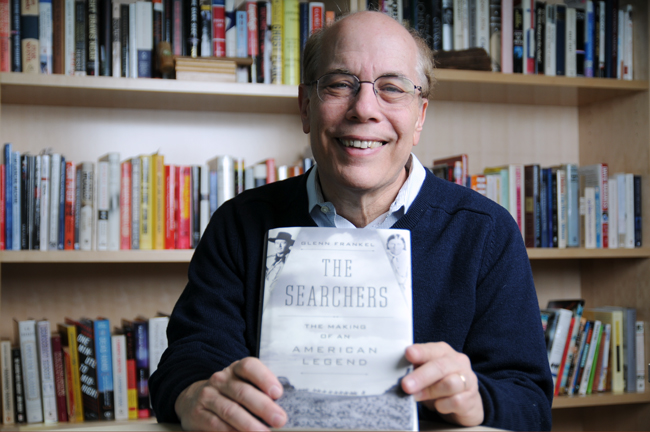“There’s a deeper meaning to westerns, which is about how we conquered the west, and what our country’s about,” Glenn Frankel, director of UT’s School of Journalism, said.
According to Frankel, on the surface westerns are about a guy with a gun and the shoot-out, but in his new book, “The Searchers: The Making of an American Legend,” Frankel explores the film and American history of the 1956 John Ford film, “The Searchers.”
David Hoffman, a former Washington Post colleague of Frankel’s and a Pulitzer Prize-winning journalist, said that Frankel’s “The Searchers” will be the cultural book of the season because Frankel took one strand of American history and followed it all the way through.
“It cuts from a really raw, serious, violent conflict to a great filmmaker trying to make a film,” Hoffman said. “History is best understood by somebody who can show that it cuts across culture, mythology [and] dirty old clippings. And that’s the great thing about this book. It’s a journey through history that is completely cutting across different times. And you feel like you’ll see things in a different way.”
Frankel is a former Washington Post reporter and a Pulitzer Prize winner. In his book, he addressed the incident in which Comanche Indians kidnapped 9-year-old Cynthia Ann Parker who grew up as a Comanche Indian, married a warrior and bore him three children before her American family came to “rescue” her and her infant daughter 24 years later. Frankel examines this event from both a historical standpoint and through the lens of John Ford’s film.
Frankel said his subtitle, “The Making of an American Legend,” describes how every generation re-imagines history, then changes what it doesn’t like in order to fit its own sensibility and needs. When writing the book, Frankel tried to put himself in Parker’s shoes.
“I think it was pretty clear by the way she acted how frightened she was, how vulnerable she felt,” Frankel said. “Can you imagine what that’s like? I had to. I tried to. I can’t feel those feelings in the same way, but I tried really hard to see what that would be like. It’s great to see her picture, to look in her eyes at her half-panicked ‘I don’t know what I’m doing here.’ You use every clue you can. You go with what they give you.”
Joseph McBride, Ford’s biographer and a film professor at San Francisco State University, described Frankel as a reporter at heart who does great research to find out about things lacking sufficient knowledge.
“His research is astonishing,” McBride said. “He has many great discoveries important for American history. He’s a great writer who tells the story very engagingly. It’s a very gripping book. I read it almost in one sitting. It’s rich. He understands people really well and is fascinated by complexities and varieties, which you can see in the book. It was a story [that] needed to be told.”
According to Frankel, the future is all decided but it’s the past that’s unclear. However, Frankel does not want to teach history lessons with his book, he wants to tell stories.
“It’s interesting to me to capture someone in a moment of crisis when they have to make decisions about what to do,” Frankel said. “They all lived such colorful, complicated lives. I feel like they were all searchers in a way, for a way to survive the world. You don’t make stuff up. You give [the readers] something powerful and meaningful and hope they get it, and they can decide how to live their lives or how to act based on it. I’ll be writing, I hope, until I leave this earth, and I’ll never be done.”
Frankel will appear at BookPeople on Wednesday at 7 p.m. for a reading and signing of his new book.
Published on February 27, 2013 as "UT Journalism school director discusses book".














